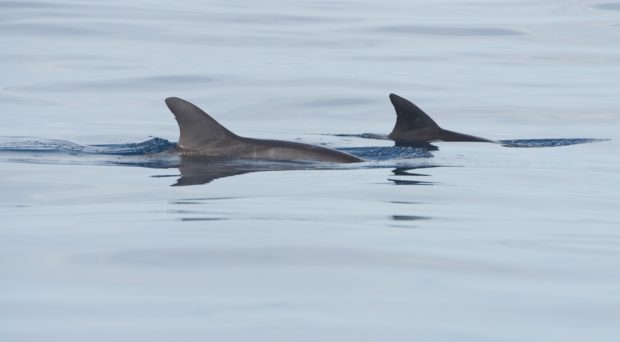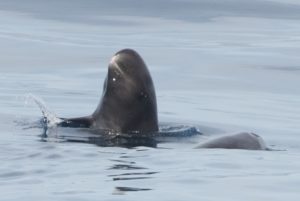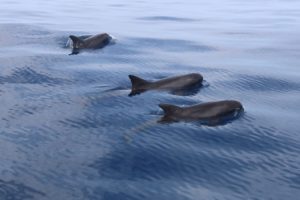
The oceans surroundiing Africa are bountiful indeed, and conservationists in the area are often surprised by what they find – as was the case at the end of April this year, when a bird and marine life survey came across 3 individuals of the enigmatic Pygmy Killer Whale species.
Recent surveys and analyses of cetacean species in Tanzanian waters have confirmed 20 cetacean species; and this news puts into sharp focus the need for a systematic look in the waters of southeastern Africa. While South Africa is fairly well-surveyed, the ranges of these creatures are vast and their ecology complex – so a greater contextual understanding in local regions is key. This sighting was made in the waters around Mozambique, and published today in the journal Marine Biodiversity Records, an official journal of the Marine Biological Association.

So what is the Pygmy killer whale?
Pygmy Killer Whales (Feresa attenuata) are an enigmatic and rarely seen species. For almost a century the species was only know by the recovery of two skulls, until the 1950s. A blackfish-boat harpooned one of the individuals, and since that point their have only been a scattering of sightings, in the Indian and Western Pacific oceans. Strandings, bycatch and sight records have made up the bulk of the current data. The International Union for Conservation of Nature (IUCN) classifies the species simply as “Data Deficient” because we know so little about them.
Another point that contributes to our lack of understanding is the frequent misidentification of individuals – often physically similar to the Melon-headed Whale (Peponacephala electra) or on some occassions the False killer whale (Pseudorca crassidens). In this sighting, indeed, they were initially misidentified as Spinner dolphins (Stenella longirostris)!
A dark grey species, with a distinctive narrowing of the body from head to fluke, they generally top out at around 2 metres long. They spend most of their time in deeper waters, preying on cephalopods, pelagic fish and even other cetaceans, such as the common dolphin. Often, in captivity, they have been seen to display a high-level of aggression, eliciting “fear reactions” in other cetacean species and moving aggressively toward trainers.

Why is this important?
A poorly-understood species is often a poorly-protected species. While they can be helped by blanket legislation to limit whaling, spear-fishing and commercial fishing, it is vital that all records of the species are collected so the marine ecology community can better understand their population dynamics, what they may be at risk from, and in which areas they show resilience. It also helps as part of a wider initiative to conduct surveys on the waters around Mozambique, and the African coast of the Indian Ocean, which is widely underrepresented in the current literature.
The development of guides and accumulation of records will also allow both researchers and the public a better chance at identifying these species in the wild, which will in turn increase the fidelity of our species distribution data.
On World Oceans Day, we urge everyone to consider the rare, the unkown and the mysterious in our oceans. The more we learn, the more we can see, the more we can do to protect it all.
One of the beautiful things of modern ecology is that we don’t just report on these sightings, we can show you them as they happened, as with the video below:
Alexander Mulhern
Latest posts by Alexander Mulhern (see all)
- Where’s the Whale? Quiz - 15th February 2019
- What webs we weave: spiders influence on food webs above and below ground - 7th March 2018
- World Oceans Day 2017 – State of the Seven Seas - 8th June 2017
Comments